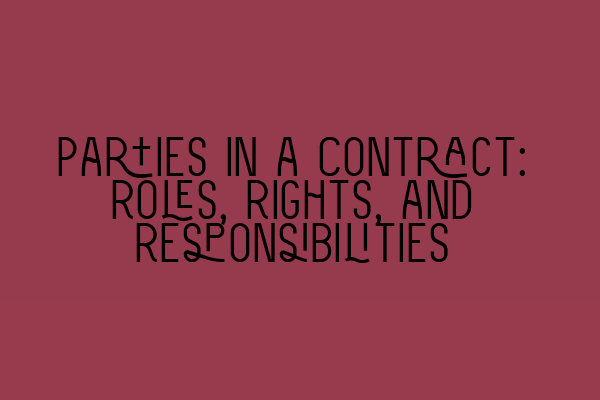Parties in a Contract: Roles, Rights, and Responsibilities
Contracts are the foundation of legal agreements, providing a framework for parties to establish their rights and obligations. Understanding the roles, rights, and responsibilities of the parties involved is crucial for a successful contract. In this article, we will delve into the various parties in a contract and their respective roles.
1. Offeror
The offeror, also known as the promisor, is the party who initiates the contract by making an offer. They propose specific terms and conditions to the offeree, expressing their willingness to enter into a legally binding agreement. The offeror holds the responsibility of ensuring that the offer is clear, definite, and communicated to the offeree.
2. Offeree
The offeree, also referred to as the promisee, is the party to whom the offer is made. They have the right to accept or reject the offer. If the offeree decides to accept, a legally binding contract is formed. However, any changes or modifications to the offer result in a counteroffer, which the original offeror can choose to accept or reject.
3. Legal Capacity
Legal capacity refers to the mental and legal ability of parties to enter into a contract. Generally, individuals who are of legal age (usually 18 years or older) and sound mind possess legal capacity. However, certain groups, such as minors and individuals with mental impairments, may lack the capacity to contract. In some cases, a guardian or parent may provide consent on behalf of these parties.
4. Legal Entity
A legal entity, such as a corporation or limited liability company (LLC), can also be a party to a contract. Unlike individuals, legal entities exist independently and have their own legal rights and liabilities. Contracts involving legal entities require the authorization of the entity’s representatives, such as directors or managers, to be legally binding.
5. Third-Party Beneficiary
While contracts are primarily between two parties, there may be instances where a third party benefits from the agreement. Known as a third-party beneficiary, this party does not have a direct contractual relationship with the offeror or offeree. However, they have the right to enforce the terms of the contract if it was intended to benefit them. It is important to clearly identify and include provisions for third-party beneficiaries in the contract.
6. Rights and Responsibilities
Each party in a contract possesses certain rights and responsibilities, which are essential for maintaining a balanced and fair agreement. Some common rights include the right to enforce the contract, seek remedies for breach, and negotiate in case of changes or disputes. Responsibilities may include fulfilling obligations, acting in good faith, and adhering to the terms and conditions of the contract.
It is crucial to consult a solicitor or legal expert while drafting or entering into a contract to ensure that your rights and responsibilities are adequately addressed. They can provide guidance on proper contract formation, review terms, and advise on legal implications.
In conclusion, parties in a contract play distinct roles and bear specific rights and responsibilities. Understanding these roles and obligations is vital to create a strong and enforceable agreement. As a solicitor, it is your duty to guide clients in navigating the complexities of contract law and protect their interests.
For more information on legal practice and related topics, check out these articles:
- Barrister vs. Solicitor: A Comprehensive Comparison
- Embracing the Rise of Virtual Law Practices
- Unveiling Real-Life Case Studies: Insights into Legal Practice and Decision-Making
- Exploring Solicitor Salaries in the UK: Average Earnings and Factors Affecting Income
- Mastering Client Relationship Management: Skills for Solicitors to Enhance Trust and Loyalty
